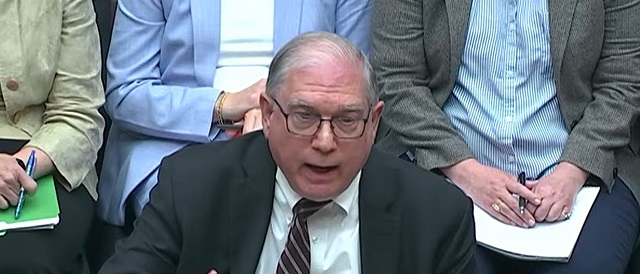Economy
Climate Panic Behind Energy Crisis

Climate activists, including members of Extinction Rebellion, participate in a demonstration in front of the Thurgood Marshall US Courthouse on June 30, 2022 in New York City. (Photo by Spencer Platt/Getty Images)
My testimony to U.S. Congress
I was delighted to be invited to testify before the United States Congress for the seventh time in two years. Below are my oral remarks. All references can be found in my full testimony, which draws on much of what I have published here on Substack over the last 18 months. To read my full testimony, please click here.
Good morning Chairwoman Maloney, Environment Subcommittee Chairman Khanna, and Ranking Member Comer, and members of the Committee. I am grateful to you for inviting my testimony.
I share this committee’s concern with climate change and misinformation. It is for that reason that I have, for more than 20 years, conducted energy analysis, worked as a journalist, and advocated for renewables, coal-to-natural gas switching, and nuclear power to reduce carbon emissions.
At the same time, I am deeply troubled by the way concern over climate change is being used to repress domestic energy production. The U.S. is failing to produce sufficient quantities of natural gas and oil for ourselves and our allies. The result is the worst energy crisis in 50 years, continuing inflation, and harm to workers and consumers in the U.S. and the Western world. Energy shortages are already resulting in rising social disorder and the toppling of governments, and they are about to get much worse.
We should do more to address climate change but in a framework that prioritizes energy abundance, reliability, and security. Climate change is real and we should seek to reduce carbon emissions. But it’s also the case that U.S. carbon emissions declined 22% between 2005 and 2020, global emissions were flat over the last decade, and weather-related disasters have declined since the beginning of this century. There is no scientific scenario for mass death from climate change. A far more immediate and dangerous threat is insufficient energy supplies due to U.S. government policies and actions aimed at reducing oil and gas production.
The Biden administration claims to be doing all it can to increase oil and natural gas production but it’s not. It has issued fewer leases for oil and gas production on federal lands than any other administration since World War II. It blocked the expansion of oil refining. It is using environmental regulations to reduce liquified natural gas production and exports. It has encouraged greater production by Venezuela, Saudi Arabia, and other OPEC nations, rather than in the U.S. And its representatives continue to emphasize that their goal is to end the use of fossil fuels, including the cleanest one, natural gas, thereby undermining private sector investment.
If this committee is truly concerned about corporate profits and misinformation, then it must approach the issue fairly. The big tech companies make larger profits than big oil but have for some reason not been called to account. Nor has there been any acknowledgement that the U.S. oil and gas industry effectively subsidized American consumers to the tune of $100 billion per year for most of the last 12 years, resulting in many bankruptcies and financial losses. As for misinformation about climate change and energy, it is rife on all sides, and I question whether the demands for censorship by big tech firms are being made in good faith, or are consistent with the rights protected by the First Amendment.
Efforts by the Biden administration and Congress to increase reliance on weather dependent renewable energies and electric vehicles (EVs) risk undermining American industries and helping China. China has more global market share of the production of renewables, EVs, and their material components than OPEC has over global oil production. It would be a grave error for the U.S. to sacrifice its hard-won energy security for dependence on China for energy. While I support the repatriation of those industries to the U.S., doing so will take decades, not years. Increased costs tied to higher U.S. labor and environmental standards could further impede their development. There are also significant underlying physical problems with renewables, stemming from their energy-dilute, material-intensive nature, that may not be surmountable. Already we have seen that their weather-dependence, large land requirements, and large material throughput result in renewables making electricity significantly more expensive everywhere they are deployed at scale.
The right path forward would increase oil and natural gas production in the short and medium terms, and increase nuclear production in the medium to long terms. The U.S. government is, by extending and expanding heavy subsidies for renewables, expanding control over energy markets, but without a clear vision for the role of oil, gas, and nuclear.
We should seek a significant expansion of natural gas and oil production, pipelines, and refineries to provide greater energy security for ourselves, and to produce in sufficient quantities for our allies. We should seek a significant expansion of nuclear power to increase energy abundance and security, produce hydrogen, and one day phase out the use of all fossil fuels. While the latter shouldn’t be our main focus, particularly now, radical decarbonization can and should be a medium- to long-term objective within the context of creating abundant, secure, and low-cost energy supplies to power our remarkable nation and civilization.
Automotive
Forget Tariffs: Biden Should Look to Domestic Mining to Thwart Chinese EVs

Fr0m Heartland Daily News
By Rick Whitbeck
The Biden administration’s decision to raise tariffs on Chinese-manufactured electric vehicles, steel, computer chips, and other technological products is the epitome of a penny wise and a pound foolish.
To much of the nation, the news was a reelection flip-flop, or an attempt to prop up the electric vehicle industry Biden has prioritized since he took office, as part of his green agenda. The international supply chain for electric vehicles isn’t going to magically stop running through the Chinese Communist Party anytime soon.
If Biden really wanted to curb Chinese geopolitical power, he would make fundamental changes to his administration’s history of attacking domestic mining opportunities. Allowing development of copper, graphite, nickel, cobalt, and other critical and strategic minerals right here at home would go much further than imposing tariffs.
Biden has demonstrated affinity for promoting “net zero” policies and forcing transitions away from traditional energy supplies of oil, gas, and coal. In a nutshell, the attacks on domestic mining projects seem completely counterproductive.
According to the International Energy Agency, staggering quantities of subsurface elements will need to be mined by at least five times their current worldwide production by 2040 to meet the Biden administration’s green energy goals. Graphite, cobalt, and lithium all will be needed in quantities exceeding 25 times (or more) their current supplies. In the next quarter century, we will need twice as much copper than has been produced in the last 3,000 years. All of which is impossible when Biden won’t let us dig.
The U.S. has tremendous opportunities to have our own mineral resources. Yet, the Biden administration has thwarted their development at nearly every turn. For example, massive copper and nickel deposits could be developed in Minnesota at the Twin Metals and Duluth Complex projects, but Biden has ordered each of them off-limits for development. The Resolution Copper prospect in Arizona met a similar fate, with the Department of Interior placing on “indefinite hold” its approval.
The Western Hemisphere’s largest copper prospect is Alaska’s Pebble Mine. Kowtowing to environmental extremists—and ignoring a clean U.S. Army Corps of Engineers’ Final Environmental Impact Statement—the Environmental Protection Agency continues to stymie progress on a deposit worth more than $500 billion. All the while shutting down the possibility of 700 full-time jobs in an area of rural Alaska that has seasonal unemployment exceeding 20%.
Alaska has been the target of more than 60 administrative and executive orders targeting its resource-based economy since Biden assumed office. One of the most recent took place on Earth Day, when a congressionally-authorized road to the Ambler Mining District—an area rich in copper, zinc, and other strategic and critical minerals—was stopped by the Department of Interior.
Just like with the Resolution mine in Arizona, the Interior Department used “Indigenous opposition” as its deciding factor, even though many villages and tribes closest to the mining district publicly support the project and its future employment opportunities. In Alaska, the Biden administration literally blocks the road to the minerals Biden’s tariffs claim to protect.
Alaska’s governor, Michael Dunleavy, along with its entire congressional delegation, has been openly critical of the continued hypocrisy of the Biden administration when it comes to talking “net zero” and acting with vigor to oppose domestic mining projects. The same response has come from many within the Minnesota and Arizona congressional community. They’ve been unable to break through to the administration, as Team Biden chooses to listen to eco-activists and career bureaucrats with an anti-development agenda.
What would hurt China, empower America, and begin to chip away at the global imbalance would be mining and processing our crucial minerals and elements domestically. Let’s see if the Biden administration wises up to that fact, or if America tires of being subservient to the CCP and makes fundamental changes to federal leadership in November.
Rick Whitbeck is the Alaska State Director for Power The Future, a national nonprofit organization that advocates for American energy jobs and fights back against economy-killing and family-destroying environmental extremism. Contact him at [email protected] and follow him on X (formerly Twitter) @PTFAlaska
This article was originally published by RealClearEnergy and made available via RealClearWire.
To read more about domestic mining to escape reliance on China, click here.
To read more about clean energy and mining, click here.
Economy
Oil Lobby Working With Republicans Behind-The-Scenes To Push ‘Gateway’ To Carbon Tax

 From the Daily Caller News Foundation
From the Daily Caller News Foundation
By NICK POPE
America’s leading oil and gas trade group is working behind the scenes with moderate House Republicans to push support for a bill that critics say could lead to a domestic carbon tax, according to an email obtained by the Daily Caller News Foundation and sources familiar with the matter.
On May 14, Chris Boness, the director of federal relations for the American Petroleum Institute (API), sent an email to an API mailing list that named several House lawmakers intending to co-sponsor the PROVE IT Act alongside Republican Utah Rep. John Curtis. The trade group has also met with staffers to try to secure support for the bill, which API supports, according to sources familiar with the matter.
Assuming the House version is the same as the already-introduced Senate version, the bill would instruct the Department of Energy (DOE) to study the carbon intensity of goods — including aluminum, steel, plastic and crude oil — produced in the U.S. and the carbon intensity of products from other countries, according to E&E News.
Dozens of the PROVE IT Act’s critics have described the bill as a possible “gateway” to domestic carbon taxes because it would effectively instruct the federal government to calculate an implicit cost of carbon with few restrictions on how that official metric is used in the future.
“Thanks for those that joined today’s meeting,” Boness wrote in the email obtained by the DCNF. “Here is the list of current [Republican] cosponsors of the PROVE IT Act: Curtis, [Michigan Rep. Tim] Walburg (sic), [Ohio Rep. Bob] Latta, [New York Rep. Andrew] Garbarino, [Florida Rep. Maria Elvira] Salazar, [Michigan Rep. Mariannette] Miller-Meeks, [Indiana Rep. Larry] Bucshon, [Oregon Rep. Lori] Chavez-DeRemer. Additionally, [Georgia Rep. Buddy] Carter, [New York Rep. Mike] Lawler and [Pennsylvania Rep. Dan] Meuser seemed interested. Will keep you updated if others join and send updates on introduction.”
API representatives have had meetings addressing the PROVE IT Act with lawmakers’ offices, sources familiar with the matter told the DCNF. The offices of Curtis, Walberg, Latta, Garbarino, Salazar, Miller-Meeks, Bucshon and Chavez-DeRemer did not respond to questions about why they apparently support the bill.
Carbon pricing is broadly unpopular with Republicans, according to E&E News. Generally, polling indicates that Republicans do not consider climate change to be a problem in need of major government-led solutions and that energy affordability, for example, is a much stronger concern.
API Email re: PROVE IT Act by Nick Pope on Scribd

The bill’s proponents tout it as a measure to reward American companies for producing products more cleanly than foreign competitors, but opponents are strongly concerned that the bill instructs the federal government to effectively set a price on carbon with insufficient restrictions what the government can do in the future.
Notably, Republican West Virginia Sen. Shelley Moore Capito introduced an amendment to the Senate version that would prevent the data collected from being used as the basis for carbon taxes or tariffs, but Democrats killed that proposal while the bill sat in the Senate Environment and Public Works Committee.
Despite concerns from those opposed to the bill that it could be a first step to carbon taxes or tariffs, API supports the PROVE IT Act. Notably, API is in favor of carbon pricing.
“America’s oil and natural gas is produced under some of the highest environmental standards in the world,” a spokesperson for API told the DCNF. “Efforts like the PROVE IT Act are bipartisan opportunities to help study and quantify that advantage and demonstrate our industry’s commitment to producing cleaner, safer, and more affordable energy here at home while still supplying the energy our world needs.”
Some of the lawmakers API suggested could be interested in co-sponsoring the PROVE IT Act are wary, however.
Rep. Meuser, whose district includes energy-rich parts of Pennsylvania, is opposed to the bill as it stands, despite API’s suggestion that he is potentially interested in supporting it, a source familiar with Meuser’s thinking told the DCNF.
Rep. Carter is skeptical of policies that could lead to a carbon tax.
“Mr. Carter is reviewing the legislation,” a spokesperson for Carter told the DCNF. “He is absolutely opposed to anything that could lead to a carbon tax.”
In the eyes of those opposed to the bill, the PROVE IT Act would make it easier for a second-term Biden administration to pursue carbon taxes or tariffs that would hurt American consumers and certain types of energy producers.
“Our opposition to the PROVE IT Act is clear and concise. The latest attempt by some in Congress who are trying to create a structure that would lead to a domestic carbon tax will have price implications on our energy, particularly our fuel,” Tom Pyle, president of the American Energy Alliance, told the DCNF. “I do think that it is important to recognize that John Podesta made it clear that this is a second term agenda item for the Biden administration. And why would any Republican want to be the lead on helping President Biden further his war on affordable energy?”
Mike McKenna, a GOP strategist with extensive experience in the energy sector, expressed a similar view.
“The big problem with the bill is that it creates infrastructure to impose a carbon dioxide tax,” McKenna told the DCNF. “As everyone who has had more than ten seconds of exposure to the federal government knows, once that infrastructure can be put in place, it’s going to be used.”
-

 Automotive23 hours ago
Automotive23 hours agoForget Tariffs: Biden Should Look to Domestic Mining to Thwart Chinese EVs
-

 MacDonald Laurier Institute1 day ago
MacDonald Laurier Institute1 day agoToronto’s “Sankofa Square” – The terrible folly and historic injustice of erasing the legacy of abolitionist Henry Dundas
-

 Great Reset2 days ago
Great Reset2 days agoRepublican governors sign letter opposing WHO treaty
-

 Fraser Institute2 days ago
Fraser Institute2 days agoFederal government should have taken own advice about debt accumulation
-

 Great Reset1 day ago
Great Reset1 day agoCanadian MP warns new WHO pandemic treaty may enshrine COVID-era freedom restrictions
-

 Media1 day ago
Media1 day agoTrudeau’s Online News Act has crushed hundreds of local Canadian news outlets: study
-

 COVID-192 days ago
COVID-192 days agoHouse COVID Committee Confirms What We Have Long Suspected — The Feds Really Hate Transparency
-

 Health2 days ago
Health2 days agoUniversity of Toronto Study Finds Teen Marijuana Use Tied To Dramatic Increased Risk Of Psychosis





